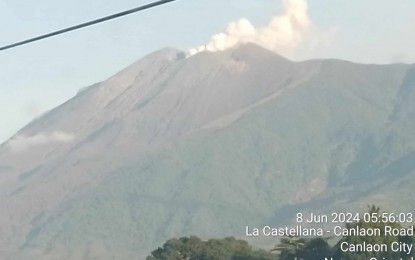High gas flux observed in Kanlaon Volcano anew
- Lyn Tallio
- Jul 2, 2024
- 2 min read
Kanlaon Volcano (File photo)

High volume of sulfur dioxide (SO2) emission was observed in Kanlaon Volcano on Tuesday, just four days after its highest SO2 emission for the year was recorded.
In an advisory, the Philippine Institute of Volcanology and Seismology (Phivolcs) said the Kanlaon Volcano emitted an average of 5,083 tonnes of SO2 on Tuesday, a little lower than the 5,397 tonnes it emitted last June 28.
"Kanlaon has been degassing increased concentrations of volcanic SO2 this year at an average rate of 1,273 tonnes/day prior to the 3 June 2024 eruption, but emission since then has been particularly elevated at a current average of 3,254 tonnes/day," the advisory read.
Earlier, Phivolcs Director Teresito Bacolcol said the fluctuations in SO2 emissions could be due to interaction of groundwater and volcanic gases, or shifts in magma movement.
"When groundwater heats up, it can carry dissolved SO2 to the surface, increasing emissions," he said.
Another cause could be magma getting closer to the surface, releasing more gas, Bacolcol said.
Meanwhile, Phivolcs said Kanlaon's volcanic earthquake activity has persisted at an average of 10 per day.
Kanlaon Volcano is still under Alert Level 2, which means the current unrest driven by shallow magmatic processes could lead to explosive eruptions or precede hazardous magmatic eruption at the summit crater.
The public is strongly advised to refrain from entering the 4-km. permanent danger zone to minimize risks from volcanic hazards such as pyroclastic density currents, ballistic projectiles, rockfall and others.
Aviation authorities are urged to advise pilots to avoid flying close to the volcano’s summit as ash and ballistic fragments from sudden eruption can be hazardous to aircraft.
Phivolcs said in case of ash fall events, communities should cover their nose and mouth with a damp, clean cloth or dust mask.
Comments